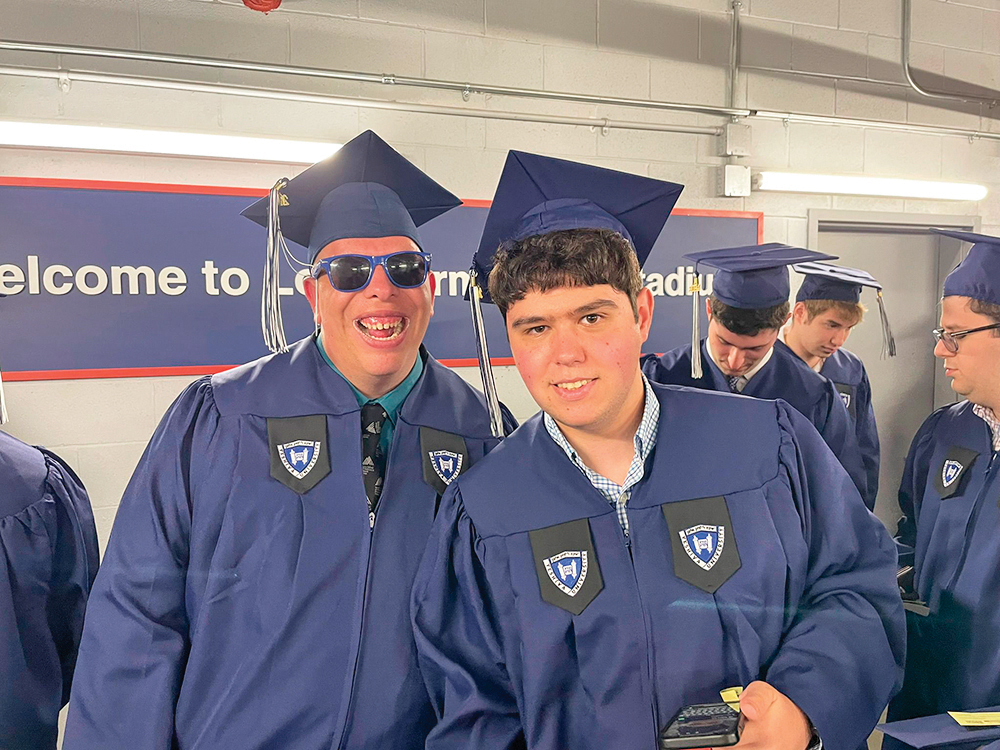
Graduation day generates tears and cheers for teachers. On the one hand, teachers celebrate their students’ completion of academic requirements. On the other hand, teachers say farewell to a group of beloved students. Although teachers encounter this bittersweet experience yearly, saying goodbye never gets easier.
Last month, two students graduated from the Makor College Experience (MCE). The Makor College Experience is a partnership program of Makor Care and Service Network and Yeshiva University that offers young men with intellectual and developmental disabilities an opportunity to have a college experience on YU’s famous Wilf campus as they prepare for lives of independence. Its founder, Dr. Stephen Glicksman, graduated from Yeshiva University in 1991. Yeshiva University’s daily Torah studies, stimulating secular classes and unique meeting ground for Jewish students from all over the world provided Glicksman an unforgettable college experience.
Now an adjunct professor at YU and director of innovation at Makor, Glicksman created MCE eight years ago to offer Jewish students with intellectual and developmental disabilities an opportunity to also experience the magic of YU. Like all YU students, Makor students learn daily morning seder from a rebbe; take secular and life skills-related classes in the afternoon; and attend YU clubs, events, night seder and basketball games in the evening.
Max Tepler and Tomer Mandelbaum represent the Makor College Experience’s graduating class of 2024. Over the last three years, I have taught and advised both students. Before saying farewell, I would like to share lessons gleaned from each graduate.
Max hails from Englewood. Over the last three years, his social skills have transformed at MCE. On the first day of school, I ate lunch with Max at Dunkin’. During lunch, I attempted to make small talk with him. “You like the Yankees or the Mets?” However, Max wanted to eat his lunch in silence. For the first several weeks of MCE, Max refrained from making conversation with YU students and fellow MCE classmates.
Rashi famously taught, “All beginnings are hard.” Joining this new environment prompted Max to experience persistent social discomfort.
Over the last three years, Max has learned to face and dismantle previous social discomforts. Max now pulls me and other teachers aside to catch up and schmooze. “How are you, Yosef?” Max now spends time hanging out with fellow Makor students in the dorms. Max now holds conversations with YU students at minyan and the workout gym. Readers should learn from his growth and gather courage to face their own discomforts head on.
Max’s classmates and teachers will most remember his love for Jewish music, memorable laugh and TV imitations. During classroom breaks, Max listens to Dovid Pearlman or Seth Maza’s biggest hits. Following a good joke, Max lets out a Joker-style laugh. It has the volume to wake a bear from hibernation. Max’s laughter and TV character voice imitations make fellow classmates around him smile. Furthermore, I have also observed Max utilize humor to help fellow students remain positive during times of turmoil. Readers should learn from his compassion and offer struggling friends or family members comfort during setbacks.
Tomer hails from NYC’s Upper West Side. Over the last three years, I have shared fond memories with him. They include playing pickup basketball in the YU gym. He’s got a nice jump shot. Davening with Tomer is an amazing experience. He would sit in shul the whole time, even though he cannot read Hebrew. During Shemona Esrei, Tomer would stand up and recite some form of prayer to himself.
The Gemara famously teaches, “Whether you say a lot or a little, as long as your heart is in the right place, God will hear your prayers.” God hears Tomer’s prayers.
In addition, I have also been able to learn Torah with Tomer outside of class. I read the Hebrew and he reads the English. No matter the time of day, Tomer will agree to learn. These learning sessions sometimes don’t last more than a half hour or even 15 minutes, but any bit of Torah learning counts. One Mishna or halacha matters. Readers should learn from his dedication to Hashem and be inspired to strive for higher spiritual levels.
In addition, family members, fellow students and Makor staff have noted Tomer’s immense resilience. Over the years, he has undergone more than a few dozen surgeries. Each month, Tomer sees various doctors for medical appointments. Shout out to Tomer’s favorite doctor, Dr. Issac. If you know Tomer, you’ll hear about Dr. Issac. Yet, Tomer continues to wear a smile across his face. Continues to schmooze with classmates. Continues to play basketball and drum. His strength in the face of adversity should inspire readers to always look for their own silver linings, no matter the circumstance, prognosis or setback. Dig for the positive.
Growing up, Tomer learned to play and master the drums. In the past, he played drums in the Israeli Army’s Air Force band. At his 24th birthday party, I observed Tomer play a wonderful set for 10 straight minutes. Years of steady practice have given Tomer well-established drumming skills. He hopes to practice and hone these skills forever.
To our graduates, I hope you continue to develop strong relationships with friends and family. I hope you make the world a better place. I hope you make Hashem proud. For now, goodbye and farewell.
To quote Max: “I’m praying the war in Israel will end soon.”
To quote Tomer: “Yosef, when are we learning?”
To quote a friend of Makor, Rabbi Dani Rapp: “Shoot for the moon. Because even if you fail, you’ll change yourself in the process.”
To quote Rabbi Yitzchack Cohen: “Not everyone has the head to be a rosh yeshiva. But everyone has the heart to be a good person.”
Sincerely, your teacher, Yosef Silfen.












